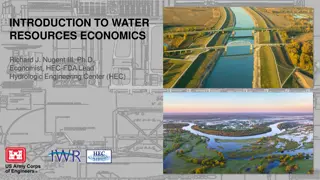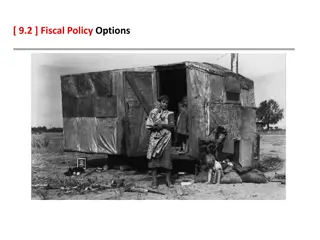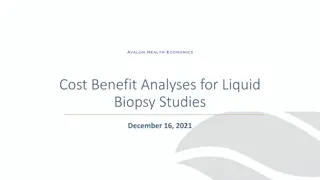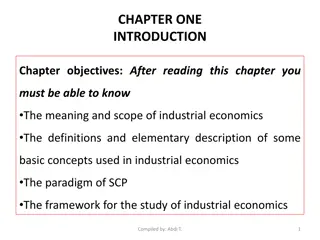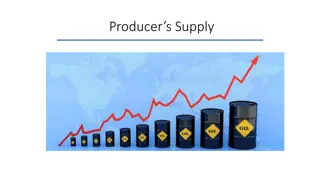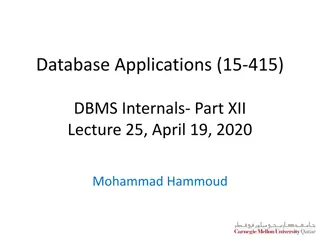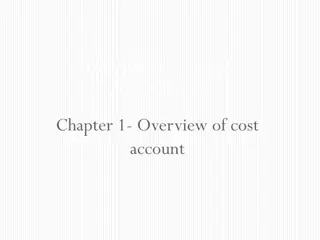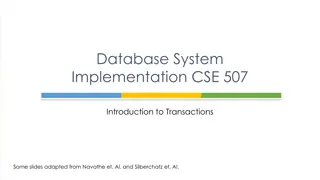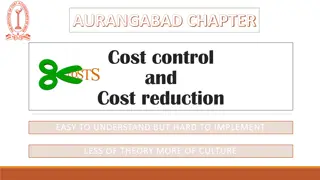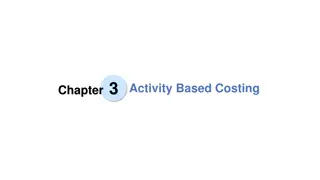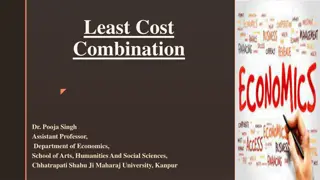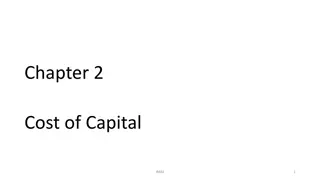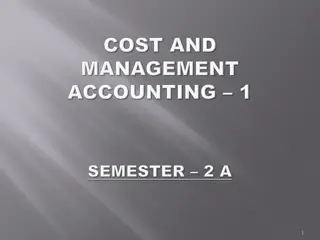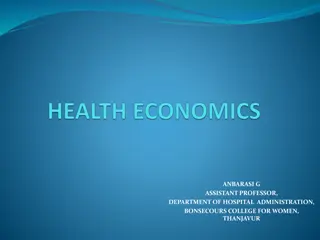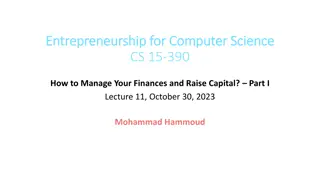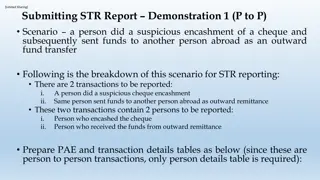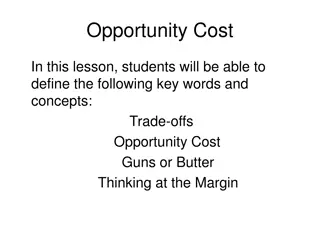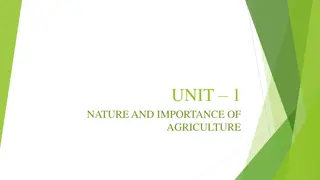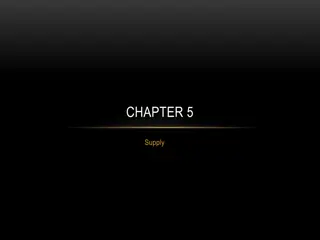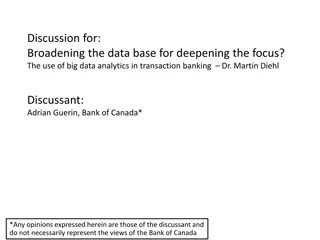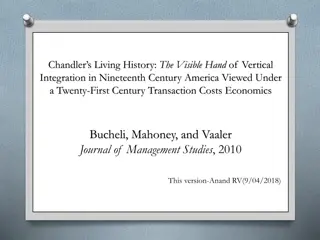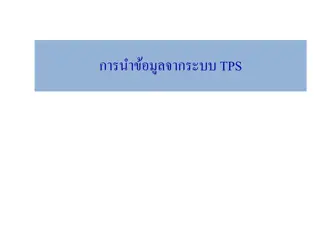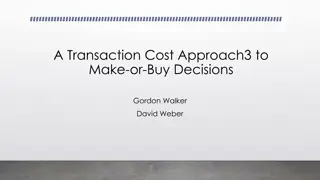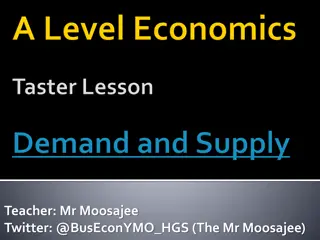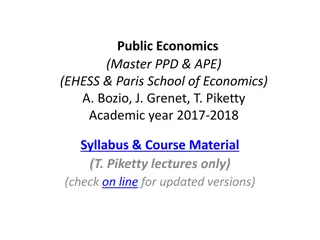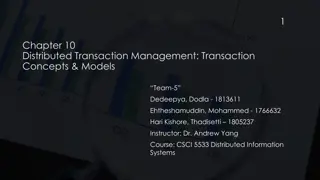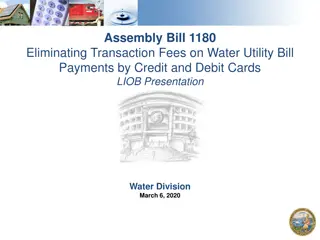Scaling the Blockchain: Rollups for Increased Transaction Speed
Exploring the challenges of scaling blockchain networks to match the transaction speeds of traditional payment networks like Visa. Solutions such as Rollups, batch processing, and payment channels are discussed to increase transaction throughput while maintaining low fees.
1 views • 57 slides
Understanding Water Resources Economics
This resource introduces the principles of water resources economics, focusing on decision-making, cost-benefit analysis, and the role of economics in flood risk management and national development. It discusses how economics influences individual and government decisions in managing limited resourc
3 views • 14 slides
Introduction to Experimental Economics by John Hey: A Comprehensive Overview
Explore the interconnected realms of Experimental Economics and Behavioral Economics through the insightful lectures of John Hey, an Emeritus Professor at the University of York. Discover the methodology of testing economic theories for validity and the practical applications of experimental economi
1 views • 58 slides
Financial Intelligence and Transaction Monitoring Conference 2022
Leading experts from the Financial Intelligence Analysis Unit (FIAU) share insights on transaction monitoring, compliance measures, and enforcement strategies at the Financial Intelligence and Transaction Monitoring Conference 2022. The event features informative sessions, case studies, panel discus
0 views • 6 slides
Understanding Water Resources Economics and Public Policy
Explore the foundations of water resources economics through topics such as decision-making, public economics perspectives, flood control acts, cost-benefit analysis, and optimization. Gain insights into how economics influences individual, household, organizational, and governmental decision-making
4 views • 15 slides
Explore Economics as a Leaving Certificate Subject
Economics as a Leaving Certificate subject prepares students for diverse career paths in business, finance, and management. The course includes a research project and a structured exam format. With a focus on theory, practical application, and real-world economic concepts, Economics equips students
5 views • 11 slides
Elevate Your Scores Master the IB Economics (SL and HL) Examination
Unlock your potential and excel in the IB Economics (SL and HL) Examination with our comprehensive study resources. Access practice exams, study guides, and expert tips to boost your scores. Start your journey towards academic success now!\nClick Here to Get IB-Economics Dumps With 16 USD Discount C
0 views • 7 slides
Understanding the Positive/Normative Distinction in Economics
Textbooks in economics often teach the Positive/Normative Distinction, where Positive Economics deals with facts and Normative Economics focuses on values and opinions. This distinction is a point of debate among scholars, with some arguing that values are intrinsic to all analysis. The debate also
0 views • 28 slides
Understanding Fiscal Policy Options in Economics
Explore the evolution of economic theories including classical economics, demand-side economics, and supply-side economics. Learn about the impact of key figures like John Maynard Keynes and Milton Friedman on fiscal policy decisions and the U.S. economy. Delve into the strategies employed during th
0 views • 18 slides
Comprehensive Cost Management Training Objectives
This detailed training agenda outlines a comprehensive program focusing on cost management, including an overview of cost management importance, cost object definition, cost assignment, analysis, and reporting. It covers topics such as understanding cost models, cost allocations, various types of an
2 views • 41 slides
Cost-Benefit Analyses for Liquid Biopsy Studies: Understanding Health Economics and Decision Making
Health economics and decision making play a crucial role in evaluating the clinical utility and cost-effectiveness of liquid biopsies. Economic models such as cost-effectiveness analyses help in determining the incremental cost-effectiveness ratio (ICER) of interventions. Studies have shown varying
0 views • 23 slides
Overview of Industrial Economics: Scope, Evolution, and Challenges
Industrial economics delves into economic issues of firms and industries, exploring their interactions with society. This chapter discusses the meaning and scope of industrial economics, its historical evolution from classical to contemporary theories, traditional concerns like firm performance and
0 views • 71 slides
Understanding Producer Economics: Concepts and Strategies
Explore key concepts in producer economics such as supply, cost minimization, revenue maximization, and cost structures. Discover the importance of time frames, input-cost relationships, and factors affecting average variable costs in the producer's decision-making process.
0 views • 22 slides
Understanding Transaction Management in DBMS
In this lecture, Mohammad Hammoud covers the key aspects of transaction management in database management systems (DBMS). Topics include locking protocols, anomaly avoidance, lock managers, and two-phase locking. The session delves into the rules, data structures, and processes involved in maintaini
1 views • 56 slides
Understanding Cost Accounting Essentials
This overview delves into topics such as financial accounting, classification of accounts, cost ascertainment, and management accounting. It covers the meaning of cost, methods and techniques of costing, advantages and limitations of cost accounting systems, and essentials for a robust cost accounti
4 views • 27 slides
Understanding Properties of Database Transactions
Database transactions play a crucial role in ensuring data integrity and consistency within a database system. This content explores the fundamental properties of transactions, such as atomicity, durability, consistency, and isolation. It delves into the requirements and implications of each propert
2 views • 44 slides
Cost Control and Cost Reduction Strategies in Business: Understanding Implementation Challenges
Understanding the concepts of cost control and cost reduction is crucial for businesses, but implementing them can be challenging. This chapter explores the influencing factors for success in cost control and reduction, emphasizing the importance of cultural aspects, leadership, and management appro
1 views • 15 slides
Understanding Activity-Based Costing (ABC) in Cost Management
Activity-Based Costing (ABC) is a strategic costing method that allocates overhead costs to products based on activities. It offers benefits such as accurate cost allocation and identifying cost drivers but also has challenges due to increased complexity and customization. ABC differs from tradition
1 views • 15 slides
Principles of Least Cost Combination in Economics
In economics, the principle of least cost combination involves determining the optimal combination of factors of production (such as capital and labor) that allows a firm to achieve maximum output at minimum cost. This is achieved by identifying the point where the isoquant curve intersects the isoc
1 views • 4 slides
Understanding the Cost of Capital in Finance
The cost of capital is crucial for businesses to determine the average cost of their finance. The Weighted Average Cost of Capital (WACC) is used as a discount rate in financial calculations. It involves estimating the cost of each source of finance and calculating a weighted average. Additionally,
0 views • 14 slides
Understanding Cost Accounting: Techniques and Processes
Cost accounting is a specialized branch of accounting that involves the accumulation, assignment, and control of costs. It encompasses techniques like ascertainment of costs, estimation of costs, and cost control to aid in decision-making. Cost accounting plays a crucial role in budgeting, standard
2 views • 11 slides
Overview of Health Economics: Key Concepts and Principles
Health economics is a vital field that explores the relationship between economics and healthcare, focusing on efficiency, value, and behavior in health production and consumption. It encompasses topics like determinants of health, demand and supply of healthcare, health sector budgeting, and equity
1 views • 12 slides
Qualities of a Successful Economics Teacher
The role of an economics teacher is crucial in shaping students' understanding and knowledge. The qualities of an effective economics teacher include expertise in economics, mastery of teaching methodologies, use of innovative teaching techniques, and a commitment to ongoing professional development
1 views • 6 slides
Financial Intelligence and Capital Management in Entrepreneurship for Computer Science
Understanding financial intelligence is crucial for success in business. Entrepreneurs must grasp unit economics, interpret financial statements, and raise capital effectively. Unit economics is key to determining if a venture is sustainable, where the Lifetime Value of an Acquired Customer must exc
3 views • 27 slides
Demonstration: Reporting Suspicious Transactions and Persons for STR
Demonstrating the process of reporting suspicious cheque encashment and outward fund transfer transactions involving two individuals - one who encashed the cheque and the other who received funds abroad. Includes detailed person and transaction information for both instances, along with the preparat
0 views • 41 slides
Insights into Vertical Integration in 19th Century America Through Transaction Cost Economics
Exploring Alfred Chandler's work and its application in understanding the evolution of business organizations in the 19th and early 20th centuries in America. The article applies transaction cost theory to explain historical shifts towards vertical integration, emphasizing the cost-efficiency of int
2 views • 16 slides
Introduction to Industrial Costing: Understanding Cost Types and Accounting Systems
Explore the fundamentals of industrial costing, including different cost types and accounting systems such as actual cost accounting, normal cost accounting, and standard cost accounting. Learn about cost data control, tasks of cost accounting, and the integration of cost type accounting in cost and
1 views • 24 slides
Understanding Trade-offs and Opportunity Cost in Economics
Learn the key concepts of trade-offs and opportunity cost in economics through engaging visuals and explanations. Explore how scarcity influences decision-making for individuals, businesses, and governments, with examples such as Guns or Butter trade-offs. Understand the significance of choosing one
0 views • 14 slides
Understanding the Significance of Agriculture Economics in India
Agriculture plays a crucial role in the Indian economy, contributing significantly to GDP and rural livelihoods. Agriculture Economics involves the study of resource allocation in the production, distribution, and consumption of agricultural goods. This branch of economics blends principles from gen
0 views • 24 slides
Understanding Supply and Costs of Production in Economics
Supply in economics refers to the availability of goods and services in the market, influenced by factors like the law of supply, supply schedules, and supply elasticity. Cost of production involves considering marginal benefits and costs in determining output levels. These concepts are vital in und
0 views • 20 slides
Exploring the Potential of Big Data Analytics in Transaction Banking
Big Data Analytics (BDA) offers valuable insights in transaction banking through varied data sources and methods like Supervised, Unsupervised, and Reinforcement learning. Use cases include anomaly detection, fraud detection, default prediction, forecasting, and sentiment analysis. Discussions also
0 views • 8 slides
Evolution of Organizational Forms in Historical Perspective
The study delves into the evolution of organizational structures through the lens of transaction cost economics (TCE) and historical legacies, analyzing the transition from putting-out systems to inside contracting. It highlights the challenges of monitoring, shirking, and transaction costs faced by
1 views • 13 slides
Transaction Processing System (TPS) Sales Data
This document contains detailed transaction data from a Transaction Processing System (TPS) including customer IDs, dates, receipt numbers, order numbers, product details, quantities, unit prices, and totals. The data spans multiple dates and includes information about sales transactions for various
0 views • 10 slides
Transaction Cost Approach to Make-or-Buy Decisions
This study explores the influences of supplier market competition, volume uncertainty, technological uncertainty, and production costs on make-or-buy decisions. Transaction cost economics theory highlights the impact of uncertainty and asset specificity on such decisions, with a focus on buyer-suppl
0 views • 10 slides
Hellenic Bank Sale Agreement & Portfolio De-Risking Transaction
Hellenic Bank has finalized a significant transaction involving the sale of a non-performing exposures portfolio and APS Debt Servicer to Oxalis, resulting in substantial de-risking of its balance sheet. The agreement includes the securitisation of NPEs and sale of the servicing platform. The transa
0 views • 5 slides
Understanding Economics: Demand, Supply, and Equilibrium
Explore the fundamental concepts of economics, including the nature and scope of economics, demand, and its determinants. Learn about normative and positive economics, microeconomics, macroeconomics, and the factors affecting demand such as income, price of the good, and complementary goods. Gain in
0 views • 19 slides
Understanding Economics: Explore the World of Scarce Resources, Prices, Government Policies, and Global Impacts
Delve into the intriguing realm of economics with Mr. Moosajee at HGS! Unravel the mysteries behind how scarce resources are allocated, why prices fluctuate, the impact of government policies, concerns about inflation, strategies for reducing unemployment, and more. Discover the relevance of economi
0 views • 20 slides
Public Economics Course Summary - EHESS & Paris School of Economics
The Public Economics course at EHESS & Paris School of Economics offers an introduction to taxation history, government intervention theories, and policy incidence across developed and developing countries. The syllabus covers topics like welfare analysis, wealth taxation, and optimal taxation strat
0 views • 11 slides
Distributed Transaction Management in CSCI 5533 Course
Exploring transaction concepts and models in distributed systems, Team 5 comprising Dedeepya, Dodla, Ehtheshamuddin, and Hari Kishore under the guidance of Dr. Andrew Yang delve into the intricacies of distributed transaction management in CSCI 5533 Distributed Information Systems.
0 views • 56 slides
Eliminating Transaction Fees on Water Utility Bill Payments
Assembly Bill 1180 aims to eliminate transaction fees on water utility bill payments made through credit and debit cards. The bill allows participating water utilities to waive these fees during their General Rate Case cycle, collecting information on payment methods, costs, customer utilization, ex
0 views • 9 slides




